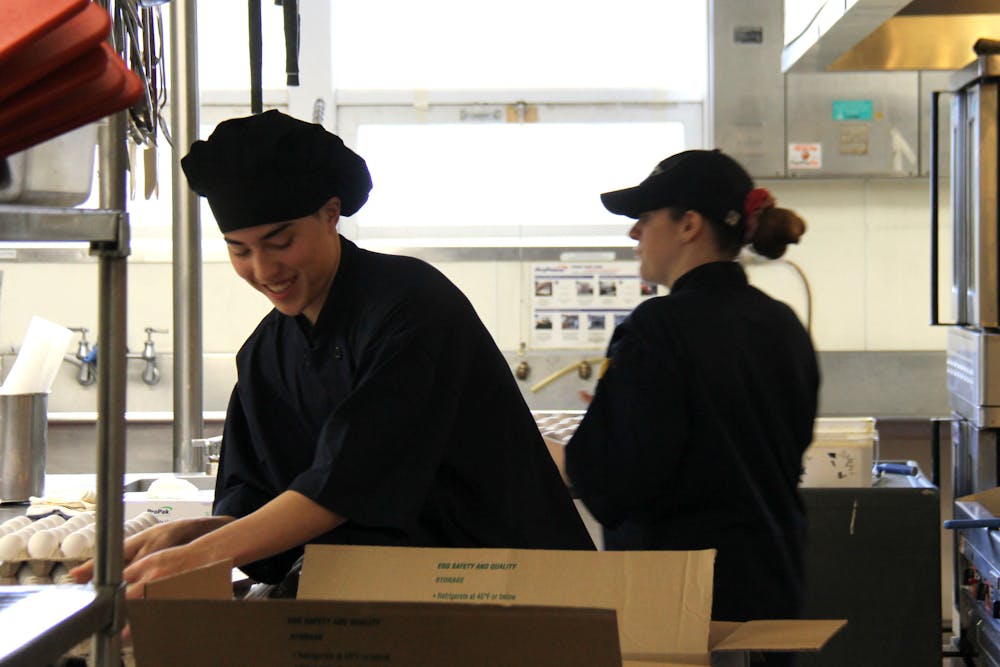Up front, to address the orange elephant in the room after Tuesday: It has never been more critical for Middlebury to properly invest in the staff that calls our college on a hill home.
I recently read an excellent article by Madeleine Kaptein ’25.5 about Middlebury's 44% turnover rate in college librarians since February 2020. Beyond its illuminating reporting, it confirmed a problem that has plagued the college since (at least) my graduation in 2016. Middlebury has lost sight of cultivating a distinctive community and lacks a vision of how to unite and support its alumni, students, faculty and staff.
Here's what distinguished Middlebury from other competitive liberal arts institutions. First, a welcoming community of faculty and staff who had been part of the Middlebury community for decades. Second, alums who gushed about their time at Midd (Middlebury often ranked near the top of alumni donations). Third, dining halls with distinct menus, no swipe system and frequent, impromptu BBQs on quads. Fourth, Middlebury's U.S. News Ranking, placing it fourth among liberal arts colleges at the time. There are real reasons to challenge the importance of rankings, but I’d be lying if I said it wasn’t a factor.
And last but not least (and my personal favorite): a ski mountain.
And while we still have the ski mountain, some of our other unique features have undeniably weakened over the last decade. Even the ski mountain has a worse logo and an objectively terrible new entrance sign (change that back!). We must take action to preserve these elements that make Middlebury unique and market them effectively.
Growing up, the father of one of my best friends taught at Vassar College. His belief in the importance of small class sizes and access to professors focused on instruction sold me on a liberal arts education. Middlebury delivered that in spades — I’m even producing a Film and Media Culture professor’s feature film. Several faculty members have become my lifelong friends, creative partners, and served as persistent ties to Middlebury, for which I am thankful.
I expected to form close bonds with professors. What surprised me, and something for which I am equally thankful, are the bonds I formed with Middlebury's talented staff.
As a film major, I split my time between film studies and production. A Middlebury staff member built the college's production expertise, filling a critical knowledge gap. That staff member helped hire the faculty to steer the more nascent production wing into a center of international renown. They dedicated late (sometimes sleepless) nights on set, taught some of my favorite classes and became as important a part of my Middlebury experience as any faculty member. With this in mind, I read about the penny-pinching, bureaucratic rationale for establishing "market wages" for librarians. The article is worth reading for more detail, though the term “skill matrix pay system” gives the gist.
Beyond being a film major, I was also an Economics major. So I’ll ask upfront: How can enough comparable "markets" exist that are as rural, isolated and high-esteemed as Middlebury College? We must avoid broadening that "market" by including less competitive institutions. Suppose Middlebury is to remain competitive with Amherst College, Bowdoin College and Williams College. In that case, we must pay for the same level of expertise and potentially a markup to overcome our regional isolation.
I won't claim to have studied Middlebury's finances in detail. Before cutting costs at the college (i.e., "right-size" staff wages), we must openly confront the most significant drain on Middlebury's resources. It's easy for a McKinsey-type consultant to identify micro-cost savings. It's significantly more difficult for an institution to evaluate its balance sheet and address its big-ticket investments. One investment springs to mind: The Middlebury Institute of International Studies at Monterey (MIIS). Monterey is one of the drivers of the college's $6.7 million budget deficit for the fiscal year 2025; in this same fiscal year, they cut the 400k in discretionary pay for staff members. Is funding MIIS worth losing Middlebury College staff members’ institutional knowledge in Vermont? As an alum who cares deeply about Middlebury College, I say no.
Retaining qualified staff with unquantifiable institutional knowledge and a deep commitment to Middlebury and Vermont is not just a criterion but a necessity for the continuity and stability of our community.
The corporatization of colleges is not unique to Middlebury, but it's not inevitable either. Middlebury needs a leader who embraces unconventional ideas and properly values the labor of the people who enable it to function. And yes, that should include good-faith discussions about faculty and staff organizing (this is Bernie’s Vermont, after all!). These decisions must happen before Middlebury’s institutional knowledge is destroyed in the name of "cost savings."
It's a challenging time to be a college president. Middlebury's next president is stepping into an even more complex role. This job requires repairing the college's community and culture. Bold actions, a clearly stated goal to keep Middlebury competitive with peer institutions and a commitment to compensating its staff are essential.
And here's a secret: It starts with the staff.


